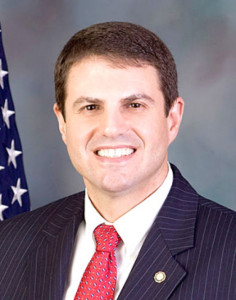 HARRISBURG – A lawmaker in Pennsylvania introduced state legislation last week that would protect teachers’ freedoms to openly discuss debates on controversial topics and theories, including biological evolution and global warming.
HARRISBURG – A lawmaker in Pennsylvania introduced state legislation last week that would protect teachers’ freedoms to openly discuss debates on controversial topics and theories, including biological evolution and global warming.
Stephen Bloom is a Republican member of the Pennsylvania House of Representatives who has been serving a district in the south-central portion of the state since 2011. An outspoken Christian, Bloom describes himself as a “strong fiscal and social conservative,” and is currently a member of the Christian Legal Society. In 2008, he wrote The Believer’s Guide to Legal Issues—a book designed to help readers discover “God’s eternal (and amazingly relevant) counsel” in regard to legal situations.
Recently, Bloom has been focusing on Pennsylvania’s education system. Late last month, he sent a bill to the state’s education committee that would prohibit the imposition of national “Common Core Standards” on Pennsylvania schools. In total, the legislation was sponsored by nearly 20 lawmakers.
Last week, Bloom announced in a memo new legislation designed to protect academic freedom in The Keystone State. In the memo, Bloom expresses his concern that freedom-suppressing efforts have “too frequently arisen” in Pennsylvania’s K-12 schools, “often in the context of the teaching and debate of controversial scientific theories and paradigms.”
“The irony in this, of course, is that the very means by which good science advances is through rigorous debate and creative challenges to the status quo,” he wrote. “It is the exercise of academic freedom which drives the ongoing scientific process of discrediting and replacing our faulty theories and testing our ever-shifting paradigms.”
Later in his memo, Representative Bloom explained how he will soon introduce state legislation that “would ensure that Pennsylvania steps up to protect academic freedom for instructional classroom speech.”
Attached to Bloom’s announcement is the draft version of a new act he authored, which would add several paragraphs to Pennsylvania’s public education code. Most notably, the bill would require public school officials to “promote an environment” where “differences of opinion about controversial issues” are critically and openly discussed.
“[Public school administrators] shall assist teachers to find effective ways to present the science curriculum as it addresses scientific controversies,” the legislation reads, “and shall permit teachers to help students understand, analyze, critique and review in an objective manner the scientific strengths and scientific weaknesses of existing scientific theories covered in the course being taught.”
In the act, Bloom mentions “biological evolution, the chemical origins of life, global warming and human cloning” as examples of controversial topics that deserve discussion.
Following his announcement last week, several evolution supporters cried foul, opining that Bloom is sneakily attempting to force intelligent design into Pennsylvania schools. As reported by Philly.com, Andy Hoover of the American Civil Liberties Union of Pennsylvania argued that the proposed legislation is completely inappropriate.
“The cosponsorship memo suggests this is the code people use when they want to inject religion into public-school science classrooms,” he stated. “Let’s leave science education to educators, and not pastors and legislators.”
Furthermore, Eugenie Scott of the evolution-supporting National Center for Science Education in California criticized Bloom’s bill as an attack on evolutionary theory.
“People who promote these bills are clearly going after evolution,” she claimed. “Because of the various court decisions, they can’t overtly promote creationism, so they’ve found a backdoor way of promoting creationism.”
However, Bloom told local ABC affiliate WHTM that his proposed act would bring important, beneficial changes to his state’s public schools.
“The free exchange of ideas was being quelled by these very strict speech codes in school,” he stated, “and, so for me … it’s just something from the heart. … I don’t see this as being an anti-science initiative at all. It’s actually to encourage the kind of thinking that leads to good science.”
Become a Christian News Network Supporter...


